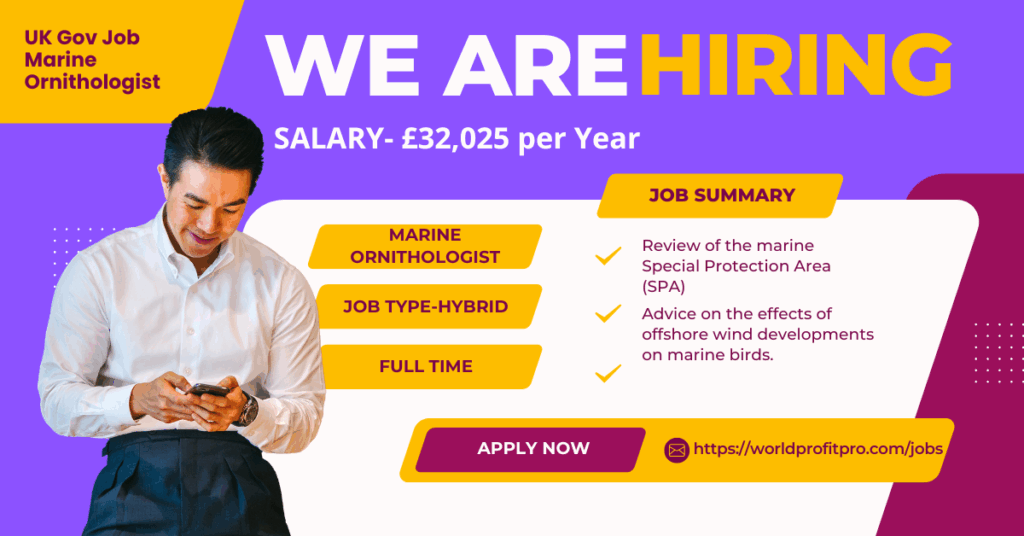
Marine Ornithologist
| Posting date: | 16 June 2025 |
|---|---|
| Salary: | £32,025 per year, pro rata |
| Hours: | Full time |
| Closing date: | 30 June 2025 |
| Location: | Peterborough, Eastern England |
| Remote working: | Hybrid – work remotely up to 2 days per week |
| Company: | JNCC Support Co |
| Job type: | Contract |
| Job reference: | 202529 |
Job Summary
This post will have a base in either Peterborough or Aberdeen. This role is being recruited on a two-year fixed term contract, with the possibility of conversion to permanent, subject to funding.
JNCC has adopted a hybrid working approach, allowing colleagues to benefit from time in the office, with the flexibility also to work from home. Employees are expected to work from one of our office bases for a few days a month as a minimum with attendance expected at regular face to face team meetings. Arrangements will vary by team and the exact balance will depend on the nature of your role. We can provide more details at the interview and offer stages.
JNCC is committed to maintaining employee health and wellbeing, whether it is physically, emotionally, financially or socially, and offers a range of benefits to support employees in this. Such benefits include the option to join the Civil Service Pension Scheme, professional and personal development opportunities as well as an exciting job in a unique environment.
Post background
The JNCC Marine Species Team includes a marine ornithology group, which provides evidence and advice on marine birds (seabirds and non-breeding marine waterbirds). Our work covers monitoring, and research and statutory advice on pressures affecting marine birds, and has both a domestic UK, UK Overseas Territories and international scope. One of the primary areas of work is on marine industries affecting marine birds, including offshore renewable energy developments and oil & gas activities. We provide statutory advice on industry plans, advise on or undertake casework for individual projects (especially for Welsh waters), and seek to support the work of the country statutory nature conservation bodies (SNCBs) on development of shared understanding of evidence and development of guidance. In addition to our specific statutory role, we engage in thematic advisory groups that are synthesising evidence to inform policy development or providing new evidence, and we undertake novel research relevant to offshore industry. At an international level, we provide technical advice in support of the UK’s and UKOTs’ commitment to the Agreement on the Conservation of Albatrosses & Petrels (ACAP), and, working with other teams in JNCC, engage in wider research and advice relating to the UKOTs’ ambitions for nature conservation. The wider role of the marine ornithology group includes monitoring seabirds, including through partnership working, providing trends, indicators and assessments of the status of marine birds, advising on designation strategy and management of protected areas, and coordination of groups engaged in pressure-specific actions and collation of evidence related to these, such as fisheries bycatch and invasive non-native predators. In addition, we support the development of strategies on marine bird conservation, both domestic and within the UKOTs.
Post Duties
Much of the work we undertake is done in collaboration with others and duties will change according to the projects that we are either leading on or contributing to so you will be expected to work on multiple projects throughout the year, and these may change from one year to the next. Current projects that you might be requested to help deliver include some of the following:
• Supporting a review of the marine Special Protection Area (SPA) network, including data analysis and review of management measures.
• Synthesising evidence to assess the effectiveness of management measures designed to compensate for loss of birds or supporting habitats in protected sites due to marine industry developments in the context of other pressures.
• Synthesising evidence to begin to assess the effects of climate change on the distribution of migratory species in the UKOTs, conservation implications, the possible risks to local communities of any changes, and the gaps in evidence to improve understanding of climate change effects and that could support adaptation.
• Supporting synthesis of evidence to assess pressures on and management options for ACAP species in the South Atlantic UKOTs.
• Supporting preparation of advice on the effects of offshore wind developments on marine birds.
Technical
To be a successful candidate you will be/have:
• A degree (BSc) or equivalent qualification in zoology or ecology, or three-years relevant professional experience
• Experience of undertaking spatial analysis using GIS (Arc or QGIS) and of using R to analyse data
Experience (Responsibilities)
To be a successful candidate you will have:
• Contributed to the delivery of evidence projects, including undertaking data management, analysis and interpretation, and writing reports.
• The ability to collate, critically review and synthesise scientific information, appraise and communicate uncertainty, and provide high-quality, impartial advice based on conclusions.
• Worked effectively with others, including external colleagues, to develop shared outputs
• Good communication skills, including having presented work to both scientific and non-technical audiences.
• An understanding of the possible effects of the offshore renewables industry or climate change on marine birds.
Behaviours
The following behaviours will be assessed via your demonstration of applied behaviours in your responses to the technical and experience section in your written application and through further assessment at interview.
• Working Together
• Making Effective Decisions
• Managing a Quality Service
• Delivering at Pace
In the event that we receive a large volume of applications we reserve the right to conduct the sift based on the Lead Behaviour of Working Together
Proud member of the Disability Confident employer scheme
About Disability Confident
A Disability Confident employer will generally offer an interview to any applicant that declares they have a disability and meets the minimum criteria for the job as defined by the employer. It is important to note that in certain recruitment situations such as high-volume, seasonal and high-peak times, the employer may wish to limit the overall numbers of interviews offered to both disabled people and non-disabled people.

